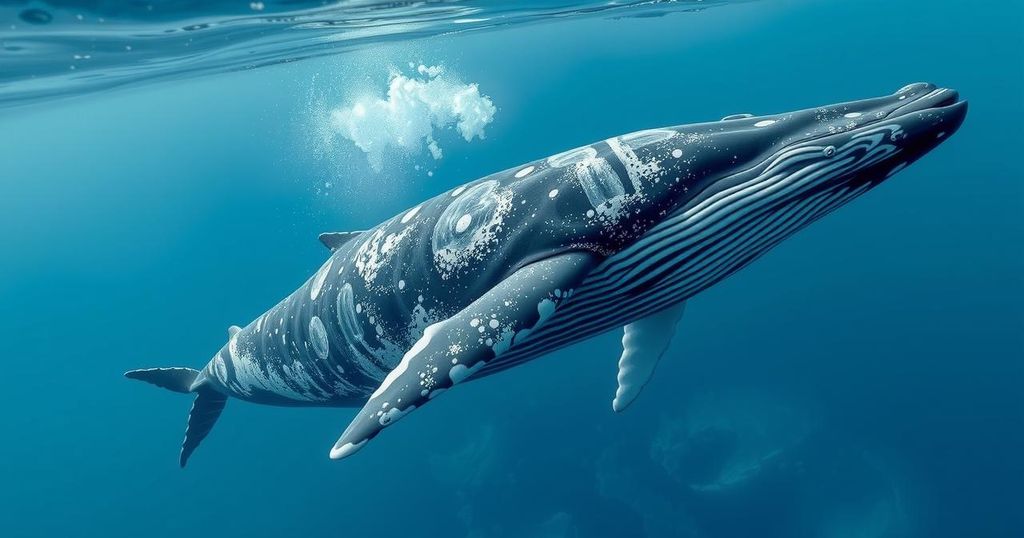A male humpback whale has set a record for the longest migration at over 8,000 miles, raising concerns about the effects of climate change on marine species. The whale began its journey in Colombia and ended near Zanzibar, with scientists highlighting potential factors behind this migration, including the search for food and changes in breeding habitats. The behavior reflects broader shifts in marine ecosystems due to rising ocean temperatures.
A male humpback whale has recently achieved a remarkable feat, completing one of the most extensive migrations documented for its species, traversing over 8,000 miles (approximately 13,000 kilometers) across various oceanic regions. This extraordinary expedition, which was meticulously observed by scientists, raises important concerns regarding the implications of climate change on these majestic marine mammals and their habitats.
The whale’s journey commenced in 2017 when researchers first sighted it near the coast of Colombia in the Pacific Ocean. After being monitored in that area over several years, the whale embarked on a significant migration, reappearing in 2022 more than 13,000 kilometers away, near Zanzibar, an island off Tanzania in the Indian Ocean. This unprecedented journey has set a new record for the species.
Scientists, including Ekaterina Kalashnikova from the Tanzanian Cetacean Program, have expressed their astonishment at this unusual migratory behavior. Kalashnikova remarked, “This migration is really impressive and unusual, even for this highly migratory species.” The underlying factors prompting this extensive migration appear to be linked to environmental changes, notably the availability of food sources.
Humpback whales predominantly feed on krill, small crustaceans that are increasingly affected by rising ocean temperatures. Recent research indicates that shifts in krill populations due to climate change might compel whales to seek alternative feeding grounds. Possible motivations behind this migration may include the search for new feeding areas, exploration of breeding habitats, or adjustments to competition among male whales as populations grow.
As climate change continues to disrupt marine ecosystems, the migratory patterns of humpback whales are evolving in response to rapidly changing environmental conditions. Traditionally, these whales undertake annual migrations between tropical breeding grounds and colder feeding waters, yet they are now required to adapt their routes to cope with diminishing resources. This migration not only reflects individual behavioral shifts but may also indicate broader changes occurring within marine ecosystems.
The factors at play are multifaceted, involving alterations in natural habitats due to global warming, the reconfiguration of migratory paths in pursuit of sustenance, and the increasing frequency of extreme weather events impacting traditional migratory routes.
Humpback whales are not alone in displaying such adaptive behaviors; other cetaceans, such as dolphins, are also venturing into new territories as their environments transform. However, these adaptations may result in heightened competition for limited resources and increased pressure on populations already facing environmental challenges. Dr. Kalashnikova noted, “the exact reasons remain unclear, but among the possible factors are global changes in climate, extreme environmental events, and evolutionary mechanisms specific to the species.” Hence, the migratory patterns of this humpback whale likely stem from a confluence of contributing factors, with climate change playing a pivotal role.
The study of marine mammals, particularly humpback whales, has gained increasing attention as climate change impacts ecosystems worldwide. Humpback whales are known for their impressive long-distance migrations between breeding and feeding grounds. These migrations are closely tied to food availability and environmental conditions. As global temperatures rise, shifts in marine life, particularly the food supply for these whales, are becoming apparent. This phenomenon underscores the broader implications of climate change on oceanic biodiversity and the need for further research into these changes.
In conclusion, the recent migration of a humpback whale across more than 8,000 miles serves as a critical indicator of the ongoing effects of climate change on marine life. This record-setting journey sheds light on the adaptive behaviors of whales in response to their changing environment. The findings emphasize the importance of understanding how ecological disruptions affect marine species and the urgent need to address the implications of climate change on ocean health.
Original Source: dailygalaxy.com






